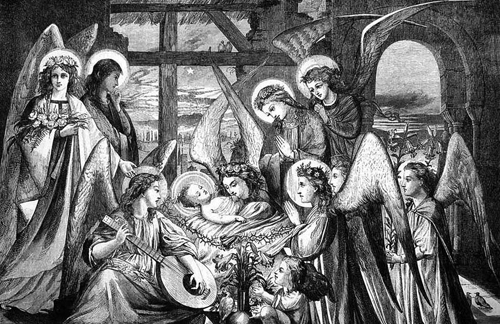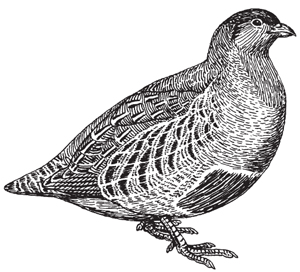Why was the Partridge in the Pear Tree? (7 page)
Read Why was the Partridge in the Pear Tree? Online
Authors: Mark Lawson-Jones


A relief depicting the Massacre of the Innocents.
The Pageant of the Shearmen and Tailors
is one of only two plays that have survived of the late medieval Mystery Plays that took place in Coventry, the other being the
Weaver’s Pageant
. The Pageant probably dates back as far as the fourteenth century and is said to be a morality play that tradesman staged for the town officials and gentry. The Pageant tells the Nativity story from the Annunciation to Mary (when the Angel tells her she is to have a son, whom she will call Jesus) to the Massacre of the Innocents.
The play’s scripts would have been kept in the town hall for safekeeping, and when a copy was required, a fee would have been paid to a scribe to reproduce it, and to the town council as owners. The oldest copy of the
Pageant
that has been recorded was one that was edited by the then mayor, Master Palmer, and dates back to 1534. Unfortunately, the manuscript was destroyed in a fire in 1879. An earlier copy had been kept elsewhere, but the original text of the
Pageant
and several edited versions have been lost.
According to the English composer and pianist, Elizabeth Poston, who edited the
Penguin Book of Christmas Carols
, the ‘Coventry Carol’ is one of three that appear in the
Pageant
. One manuscript had a later annotation by Thomas Mawdycke, 1591, which directed that ‘the women singe’ and that the shepherds sing the other two.
The only remaining evidence of the first carol is:
As I out rode this endered night,
Of thre ioli sheppanders
I saw a sight
And all a bowte there fold
A star shone bright
They sange teri terlow
To mereili the sheppards
Ther pipes can blow
The evidence of the third carol is:
Doune from heaven, from heaven so hie,
Of angeles ther came a great companie,
With mirthe and ioy and great solemnitye,
The sange terly terlow;
So mereli the sheppards their pipes can blow.
In 1910, Edith Rickert, an English professor from the University of Chicago, co-authored a major book on the history of Christmas Carols.
Ancient English Christmas Carols: 1400-1700
noted the carols from the
Pageant of the Shearmen and Tailors
, joining the first and the third carols to create another which she entitled ‘As I Rode Out this Enders Night’:

London Evening News
, Nativity Scene 1800.
As I rode out this enders night,
Of three jolly shepherds I saw a sight,
And all about their fold a star shone bright:
They sang terly terlow;
So merrily the shepherds their pipes gan blow
Down from heaven, from heaven so high,
Of angels there came a great company,
With mirth and joy and great solemnity,
They sang terly terlow;
So merrily the shepherds their pipes gan blow.
In a twist to the story, the great hymn collector William Sandys in his book
Christmas Carols Ancient and Modern
(1833), wrote that there is an old tradition that Herod’s own son was among the innocents slaughtered. According to Sandys, the evidence came from his writing partner Davies Gilbert, who declared that Prudentius, a fourth-century Roman-Christian poet, wrote about the death of Herod’s son.
There is no clear evidence that this tragedy happened; there is evidence, however, in several sources that Herod murdered his wife and two sons in around 7
BC
, and one son in 4
BC
. This didn’t stop William Sandys writing a carol about the death of Herod’s son, which he called ‘When Herod in Jerusalem’ the sixth verse of which reads:
Now mark the judgments of the Lord
On their ungodly train,
King Herod’s son where he was nurs’d
Amongst the rest was slain.
The tune of the ‘Coventry Carol’ is a Picardy third, which is a traditional European musical characteristic used widely throughout the Medieval period (500-1400) and even the Renaissance period (1400-1600), and the sadness of the subject seems to fit very well with the music in this carol with the strangest of histories.

The Twelve Days of Christmas
On the first day of Christmas
my true love sent to me:
A Partridge in a Pear Tree
On the second day of Christmas
my true love sent to me:
Two Turtle Doves
and a Partridge in a Pear Tree
On the third day of Christmas
my true love sent to me:
Three French Hens
Two Turtle Doves
and a Partridge in a Pear Tree
On the fourth day of Christmas
my true love sent to me:
Four Calling Birds
Three French Hens
Two Turtle Doves
and a Partridge in a Pear Tree
On the fifth day of Christmas
my true love sent to me:
Five Golden Rings
Four Calling Birds
Three French Hens
Two Turtle Doves
and a Partridge in a Pear Tree
On the sixth day of Christmas
my true love sent to me:
Six Geese a Laying
Five Golden Rings
Four Calling Birds
Three French Hens
Two Turtle Doves
and a Partridge in a Pear Tree
On the seventh day of Christmas
my true love sent to me:
Seven Swans a Swimming
Six Geese a Laying
Five Golden Rings
Four Calling Birds
Three French Hens
Two Turtle Doves
and a Partridge in a Pear Tree
On the eighth day of Christmas
my true love sent to me:
Eight Maids a Milking
Seven Swans a Swimming
Six Geese a Laying
Five Golden Rings
Four Calling Birds
Three French Hens
Two Turtle Doves
and a Partridge in a Pear Tree
On the ninth day of Christmas
my true love sent to me:
Nine Ladies Dancing
Eight Maids a Milking
Seven Swans a Swimming
Six Geese a Laying
Five Golden Rings
Four Calling Birds
Three French Hens
Two Turtle Doves
and a Partridge in a Pear Tree
On the tenth day of Christmas
my true love sent to me:
Ten Lords a Leaping
Nine Ladies Dancing
Eight Maids a Milking
Seven Swans a Swimming
Six Geese a Laying
Five Golden Rings
Four Calling Birds
Three French Hens
Two Turtle Doves
and a Partridge in a Pear Tree
On the eleventh day of Christmas
my true love sent to me:
Eleven Pipers Piping
Ten Lords a Leaping
Nine Ladies Dancing
Eight Maids a Milking
Seven Swans a Swimming
Six Geese a Laying
Five Golden Rings
Four Calling Birds
Three French Hens
Two Turtle Doves
and a Partridge in a Pear Tree
On the twelfth day of Christmas
my true love sent to me:
Twelve Drummers Drumming
Eleven Pipers Piping
Ten Lords a Leaping
Nine Ladies Dancing
Eight Maids a Milking
Seven Swans a Swimming
Six Geese a Laying
Five Golden Rings
Four Calling Birds
Three French Hens
Two Turtle Doves
and a Partridge in a Pear Tree
One of the most complicated and curious Christmas song has to be ‘The Twelve Days of Christmas’. It has attracted lots of speculation about its origins and is still the source of some dispute. Is this song a historic remnant of a parlour game, or is it a secretly coded text to teach oppressed people about faith?
In the Western Church, the twelve days of Christmas begin on Christmas Day and continue until the Eve of the Feast of the Epiphany.
The Oxford English Dictionary
defines the twelfth night as ‘the evening of the fifth of January, preceding the twelfth day’. This night is traditionally the end of the Christmas season, the beginning of the Epiphany season, and the day when merriment would cease.

A common grey partridge.
The twelve days of Christmas as a festival has a long history. It was first mentioned by one of the Fathers of the Early Eastern Orhodox Church, Ephrem the Syrian (
AD
306-373), who called it a Festal Tide. At the Western Church Council of Tours in
AD
567, it was confirmed as a Festival of the Church, and in the Laws of Ethelred (991-1016) it was ‘ordained it to be a time of peace and concord among Christian men, when all strife must cease’.
Although the exact origins of the song are unknown, it is highly probable that it began as a memory and forfeit game for twelfth night celebrations, which would have been said and not sung. The players gathered in a circle and the leader would recite a verse and each would repeat it, the leader would add another verse, and speak faster, and so on until a mistake was made by one of the players, who would then drop out of the game. The winner would be the one who could remember all the items in order, being able to recite them at speed. The earliest printed version that suggests this was the case is found in the children’s book
Mirth Without Mischief
(
c
. 1780).
The book contained ‘Twelve Pleasing Pastimes’ including ‘The Twelve Days of Christmas’ and the wonderfully named ‘Play of the Gaping Wide Mouthed Waddling Frog sung at King Pippins Ball’. The game is certainly much older than the printed version, as the 1780 book was a compilation of games played in parts of Britain in the past.
Although there is some debate about the actual age of the game, it is fair to say that the consensus is that is dates to the early sixteenth century. This is where difficulties arise however. If the game were written 200 years before the book was printed, it wouldn’t have made much sense to the British people, because partridges didn’t perch in pear trees. This led some people to suggest that the game is of French origin.
The red-legged, or French, partridge perches in trees more frequently than the English common or grey partridge. The French red-legged partridge was not successfully introduced to Britain until the 1770s, long after this game had achieved some popularity. If this sounds all too far-fetched, and why shouldn’t we sing about athletic British partridges sat high up in pear trees, the other piece of evidence that the original game might be French comes down to translation.